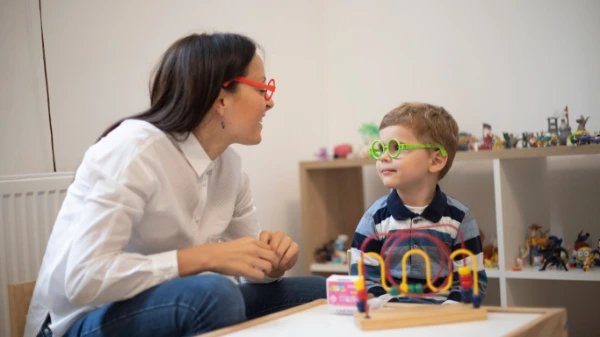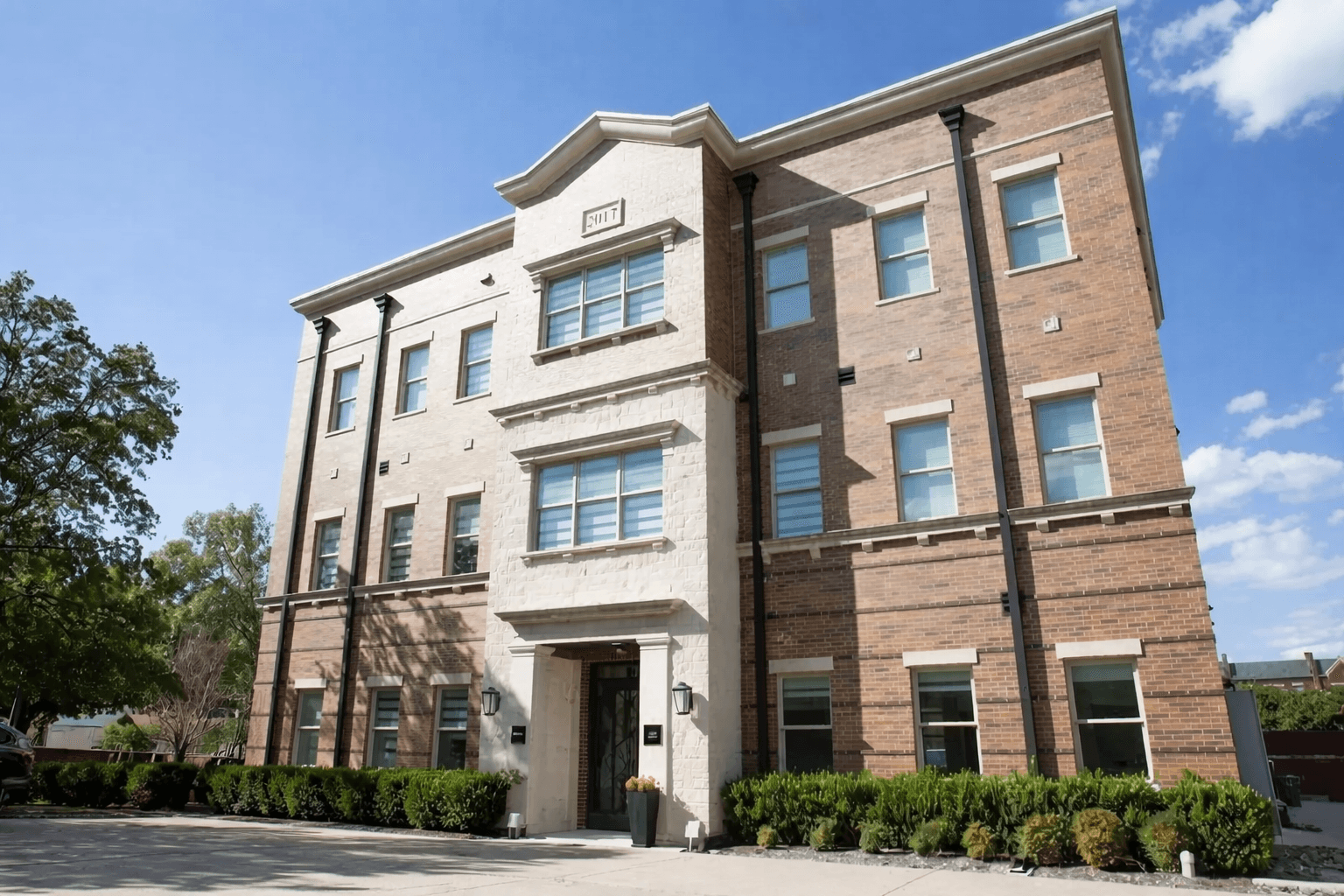At Anchor of Hope Counseling in Southlake, we understand that children with Attention Deficit Hyperactivity Disorder (ADHD) face unique challenges that can impact their daily lives, both at home and in other environments such as school. Our specialized ADHD counseling services in Southlake are designed to provide support, strategies, and tools to help children, not just manage their symptoms, but thrive.
Our compassionate and experienced counselors partner with families to create personalized ADHD treatment plans that meet each child’s specific needs and compliment their unique personality. Through engaging activities and tailored interventions, we aim to help children improve their focus, organization, relationships, and emotional well-being, fostering a positive environment for growth and development.

Attention-Deficit/Hyperactivity Disorder (ADHD) is a common neurodevelopmental condition that affects focus, impulse control, and activity levels. Individuals with ADHD may struggle with staying organized, completing tasks, or managing restlessness. It can impact children and adults alike, often influencing academics, work, and personal relationships.

ADHD (Attention-Deficit/Hyperactivity Disorder) is classified as a neurodevelopmental disorder because it affects how the brain grows and functions, particularly in areas responsible for attention, impulse control, and executive functioning. These differences in brain development typically begin in early childhood and can continue into adulthood.
Research shows that ADHD is linked to differences in brain structure and activity, especially in regions that manage focus, behavior regulation, and decision-making. These neurological differences are not the result of poor parenting or lack of discipline—they are rooted in how the brain is wired.
Understanding ADHD as a neurodevelopmental condition helps reduce stigma and emphasizes the importance of early support, structured interventions, and compassionate care. At Anchor of Hope, we work with individuals and families to develop personalized strategies that support growth, learning, and emotional well-being.
While ADHD is widely recognized for symptoms like inattention and hyperactivity, it is increasingly understood as a self-regulation disorder. This means that individuals with ADHD often struggle to manage their attention, emotions, impulses, and behavior in ways that align with their goals, values, and the demands of their environment.
attention, impulse control, and executive functioning. These differences in brain development typically begin in early childhood and can continue into adulthood.
Self-regulation involves a set of mental skills—such as self-awareness, impulse control, emotional regulation, and working memory—that help us pause, reflect, and make thoughtful decisions. In ADHD, these executive functions are often impaired, making it harder to stay focused, resist distractions, manage frustration, or follow through on tasks
Understanding ADHD through the lens of self-regulation helps shift the focus from simply managing symptoms to building skills that support long-term growth and resilience. At Anchor of Hope in Southlake Texas, we help clients develop practical strategies to strengthen self-regulation and improve daily functioning in school, work, and relationships.
ADHD is deeply connected to how the brain manages executive functions, the mental skills that help us plan, organize, regulate emotions, and follow through on tasks. These skills act like the brain’s management system, guiding how we focus, make decisions, and control impulses.
In individuals with ADHD, these executive functions often don’t develop in the same way or at the same pace as in others. This can lead to challenges such as:
Understanding ADHD as a disorder of executive functioning helps explain why everyday tasks—like getting ready in the morning, finishing homework, or managing emotions—can feel overwhelming. It also shifts the focus from “trying harder” to building strategies that support how the brain works best.
How Counseling Can Help
Living with ADHD can feel overwhelming at times—but you don’t have to navigate it alone. At our counseling center, we believe in meeting each person with empathy, understanding, and the tools to help them thrive.
Counseling offers a safe, supportive space where individuals with ADHD can:
Discover their unique strengths and learn how to use them with confidence
Build practical skills for focus, organization, and emotional balance
Learn to quiet the inner critic and replace self-doubt with self-compassion
Strengthen relationships through better communication and understanding
Create routines and rhythms that bring calm to the chaos

Our ADHD therapists stay up to date on the latest ADHD research and clinical approaches. They use proven approaches like Cognitive Behavioral Therapy (CBT), mindfulness, and executive functioning coaching to help clients of all ages better understand their ADHD and take meaningful steps toward their goals.
Whether you’re a parent seeking support for your child, a teen navigating school pressures, or an adult rediscovering your potential, we’re here to walk beside you. Because with the right support, ADHD doesn’t have to be a barrier—it can be a bridge to a more empowered, joyful life.
Effective ADHD treatment involves a strong partnership between counselors and caregivers. Caregivers play a crucial role in implementing strategies and reinforcing positive behaviors at home. Our counseling services include parent training that equips parents with the skills and knowledge to support their child’s development.
By working together, we can create a consistent and supportive environment that helps children with ADHD succeed. This partnership ensures that parents are actively involved in the treatment process, providing ongoing support and adapting strategies as needed to meet their child’s evolving needs
Collaborating with other resources, such as school counselors and psychiatrists can be an essential component for comprehensive ADHD treatment. With the approval and request of parents, our counseling team is willing to collaborate with your child’s support team.
By collaborating with psychiatrists, our counselors can ensure that children receive a holistic approach to treatment that addresses both psychological and biological aspects of ADHD. This integrated approach promotes the overall well-being of children and helps them thrive in all areas of their lives.
School counselors can provide valuable ADHD support within the educational environment, helping to implement individualized education plans (IEPs) and behavioral interventions. They work closely with teachers and parents to ensure that children receive the necessary accommodations and support to succeed academically and socially. Psychiatrists play a crucial role in managing the medical aspects of ADHD treatment in Southlake, including medication management.
Living with ADHD can feel overwhelming at times—but you don’t have to navigate it alone. At our counseling center, we believe in meeting each person with empathy, understanding, and the tools to help them thrive.
Counseling offers a safe, supportive space where individuals with ADHD can:
Discover their unique strengths and learn how to use them with confidence
Build practical skills for focus, organization, and emotional balance
Learn to quiet the inner critic and replace self-doubt with self-compassion
Strengthen relationships through better communication and understanding
Create routines and rhythms that bring calm to the chaos
Our therapists stay up to date on the latest ADHD research and clinical approaches. They use proven approaches like Cognitive Behavioral Therapy (CBT), mindfulness, and executive functioning coaching to help clients of all ages better understand their ADHD and take meaningful steps toward their goals.
Whether you're a parent seeking support for your child, a teen navigating school pressures, or an adult rediscovering your potential, we’re here to walk beside you. Because with the right support, ADHD doesn’t have to be a barrier—it can be a bridge to a more empowered, joyful life.
Effective ADHD treatment involves a strong partnership between counselors and caregivers. Caregivers play a crucial role in implementing strategies and reinforcing positive behaviors at home. Our counseling services include parent training that equips parents with the skills and knowledge to support their child's development.
By working together, we can create a consistent and supportive environment that helps children with ADHD succeed. This partnership ensures that parents are actively involved in the treatment process, providing ongoing support and adapting strategies as needed to meet their child's evolving needs
Collaborating with other resources, such as school counselors and psychiatrists can be an essential component for comprehensive ADHD treatment. With the approval and request of parents, our counseling team is willing to collaborate with your child’s support team.
By collaborating with psychiatrists, our counselors can ensure that children receive a holistic approach to treatment that addresses both psychological and biological aspects of ADHD. This integrated approach promotes the overall well-being of children and helps them thrive in all areas of their lives.
School counselors can provide valuable support within the educational environment, helping to implement individualized education plans (IEPs) and behavioral interventions. They work closely with teachers and parents to ensure that children receive the necessary accommodations and support to succeed academically and socially. Psychiatrists play a crucial role in managing the medical aspects of ADHD treatment, including medication management.
While ADHD is often discussed in terms of challenges, it also comes with incredible gifts. Children with ADHD often possess remarkable strengths that, when nurtured, can help them thrive at home, in school, and in life. At Anchor of Hope Counseling in Southlake, we’re here to help you and your child discover those strengths and build a path forward with confidence and compassion.

Children with ADHD often have vivid imaginations and a natural flair for storytelling, art, and creative play. Their ability to think in unique and original ways can lead to amazing ideas and innovations.
That endless energy can be a challenge to manage, but it’s also a gift. With the right outlets—like sports, dance, or outdoor play—your child’s energy can become a source of joy, motivation, and achievement.
Life with a child who has ADHD is rarely dull. Their spontaneity, quick wit, and playful spirit can bring laughter and light into your home.
While attention may wander in some settings, many children with ADHD can become deeply absorbed in activities they enjoy—whether it’s building with blocks, drawing, or exploring nature. This “hyperfocus” can be a powerful tool for learning and growth.
Many children with ADHD are emotionally sensitive and deeply caring. They often show great compassion for others and can form strong, loving connections with family and friends.
Children with ADHD often face more obstacles than their peers—but they also develop incredible resilience. With support and encouragement, they learn to bounce back, try again, and keep going.
Diagnosing ADHD is a thoughtful and comprehensive process that goes beyond simply identifying symptoms. At Anchor of Hope Counseling, our licensed clinicians work with you side-by-side throughout the process integrating your personal experience with evidence-based guidelines to ensure an accurate and meaningful diagnosis.
The process typically includes:
Because ADHD affects each person differently, we take a personalized approach—ensuring that the diagnosis is accurate and that any recommended support is tailored to the individual’s unique needs.

At Anchor of Hope, we believe every child deserves to feel seen, heard, and understood—especially when navigating the challenges of ADHD. We know that ADHD can look very different in boys and girls, and we honor those differences with care, empathy, and personalized support.
For boys, ADHD often shows up in ways that are hard to miss—restlessness, impulsivity, or big bursts of energy.
For girls, ADHD can be quieter but just as impactful—daydreaming, disorganization, or deep emotional sensitivity. These signs are often overlooked, and girls may silently struggle with self-doubt. We create a safe, nurturing space where girls can build self-awareness, resilience, and the tools they need to shine.
Every child’s journey with ADHD is unique. That’s why we take the time to listen, to understand, and to walk alongside families with compassion and hope—helping each child grow into their strengths and feel proud of who they are.


For many living with ADHD, the hardest part isn’t the distraction or the restlessness—it’s the quiet voice inside that says, “Why can’t I just get it right?” Sometimes, having ADHD can make kids feel like they’re always getting in trouble, forgetting things, or not doing things “right.” They might wonder, “Why is this so hard for me?” and start to feel like they’re not smart or not good enough.
But the truth is—kids with ADHD are bright, creative, and full of potential. They just need support that helps them shine in their own way. When others don’t see the struggle beneath the surface, it’s easy to start believing the worst about yourself.
At Anchor of Hope Counseling, we see the whole person – not just the symptoms. We understand how ADHD can wear down self-esteem, and we’re here to help rebuild it with compassion and care.
In therapy, we help clients:
We believe every child deserves to feel proud of who they are. With the right tools and a lot of heart, we help kids with ADHD feel strong, capable, and truly good about themselves—just as they are.
Children with ADHD often feel emotions more intensely—and sometimes, those big feelings can be hard to manage. Whether it’s frustration that turns into a meltdown, excitement that’s hard to contain, or sadness that feels overwhelming, emotional ups and downs are a common part of the ADHD experience.
That’s because ADHD affects more than attention—it also makes it harder for kids to pause, process, and respond to their feelings in a calm way. Without the tools to manage those big emotions, children may feel overwhelmed, misunderstood, or even ashamed of how they react.
At Anchor of Hope, we help children:
With patience, support, and the right tools, kids with ADHD can learn to navigate their emotions with greater ease—and feel proud of the progress they make along the way.

At Anchor of Hope, we believe every child deserves to feel seen, heard, and understood—especially when navigating the challenges of ADHD. We know that ADHD can look very different in boys and girls, and we honor those differences with care, empathy, and personalized support.
For boys, ADHD often shows up in ways that are hard to miss—restlessness, impulsivity, or big bursts of energy.
For girls, ADHD can be quieter but just as impactful—daydreaming, disorganization, or deep emotional sensitivity. These signs are often overlooked, and girls may silently struggle with self-doubt. We create a safe, nurturing space where girls can build self-awareness, resilience, and the tools they need to shine.
Every child’s journey with ADHD is unique. That’s why we take the time to listen, to understand, and to walk alongside families with compassion and hope—helping each child grow into their strengths and feel proud of who they are.
For many living with ADHD, the hardest part isn’t the distraction or the restlessness—it’s the quiet voice inside that says, “Why can’t I just get it right?” Sometimes, having ADHD can make kids feel like they’re always getting in trouble, forgetting things, or not doing things “right.” They might wonder, “Why is this so hard for me?” and start to feel like they’re not smart or not good enough.
But the truth is—kids with ADHD are bright, creative, and full of potential. They just need support that helps them shine in their own way. When others don’t see the struggle beneath the surface, it’s easy to start believing the worst about yourself.
In therapy, we help clients:
We believe every child deserves to feel proud of who they are. With the right tools and a lot of heart, we help kids with ADHD feel strong, capable, and truly good about themselves—just as they are.
Children with ADHD often feel emotions more intensely—and sometimes, those big feelings can be hard to manage. Whether it’s frustration that turns into a meltdown, excitement that’s hard to contain, or sadness that feels overwhelming, emotional ups and downs are a common part of the ADHD experience.
That’s because ADHD affects more than attention—it also makes it harder for kids to pause, process, and respond to their feelings in a calm way. Without the tools to manage those big emotions, children may feel overwhelmed, misunderstood, or even ashamed of how they react.
At Anchor of Hope, we help children:
With patience, support, and the right tools, kids with ADHD can learn to navigate their emotions with greater ease—and feel proud of the progress they make along the way.
Children with ADHD often show signs of inattention, hyperactivity, impulsivity, and poor emotional regulation. Common behaviors include difficulty focusing, being easily distracted, fidgeting or squirming, talking excessively, acting without thinking, and struggling to follow instructions or complete tasks. Although all children exhibit behaviors similar to these, children with ADHD show these behaviors more frequently and intensely than what’s typical for their age and have seen a negative effect to their success at school, home, and with friends.
Not always. Every child—and every brain—is different. While medication can be very effective for many people with ADHD—especially in reducing symptoms like inattention and impulsivity—it’s not the only option. Treatment plans often include behavioral therapy, parent coaching, school support, and lifestyle changes, especially for younger children. The best approach depends on the individual’s age, needs, and family preferences.
At Anchor of Hope Counseling, we take the time to listen, understand, and walk alongside you. Together, we’ll explore all options—gently and thoughtfully—so your child can grow with confidence in a plan that feels right for you.
Yes, our counselors are trained and authorized to assess and diagnose ADHD. See the website above regarding our diagnosis process.
ADHD can look very different depending on your age. In children, it often shows up as hyperactivity, impulsiveness, or emotional regulation issues—behaviors that are easy to spot in classrooms or at home. In adults, those same challenges may shift into things like forgetfulness, disorganization, difficulty managing time, feeling mentally restless, or struggling with relationship success.
While the symptoms may change, the need for understanding and support stays the same. Anchor of Hope Counseling can help.
Yes, absolutely. Not everyone with ADHD is hyperactive. Some children and adults experience what's known as Predominantly Inattentive ADHD, where the main challenges involve focus, organization, and staying on task—without the high energy or restlessness often associated with ADHD. Other symptoms can be avoidance of tasks, careless mistakes, daydreaming, appearing not to listen, and trouble following instructions.
ADD (Attention Deficit Disorder) is an older term that used to describe individuals who had trouble focusing but didn’t show signs of hyperactivity. Today, the official term is ADHD (Attention-Deficit/Hyperactivity Disorder), which includes three types:
-Inattentive type (formerly called ADD)
-Hyperactive-impulsive type
-Combined type
The name may have changed, but the experience is still very real. Whether it’s called ADD or ADHD, what matters most is understanding how it affects each person—and offering support that’s kind, thoughtful, and tailored to their needs. At Anchor of Hope Counseling, we’re here to help you make sense of it all, with compassion and care every step of the way.
ADHD (Attention-Deficit/Hyperactivity Disorder) is recognized as a neurodevelopmental disorder and can be considered a disability under laws like the Americans with Disabilities Act (ADA) and Section 504 of the Rehabilitation Act. This means children and adults with ADHD may be eligible for accommodations at school or work to support their success. At the same time, many people with ADHD also have unique strengths—and with the right support, they can thrive.
While ADHD often continues into adulthood, many people find that their symptoms change and become easier to manage over time—especially with the right support. As children grow, they can develop new coping skills, build on their strengths, and learn strategies that help them thrive in school, relationships, and beyond.
The journey with ADHD doesn’t have to be a struggle—it can be a path of growth, resilience, and self-discovery. At Anchor of Hope, we’re here to help every step of the way,

See our Privacy Policy for details on how we handle your information.